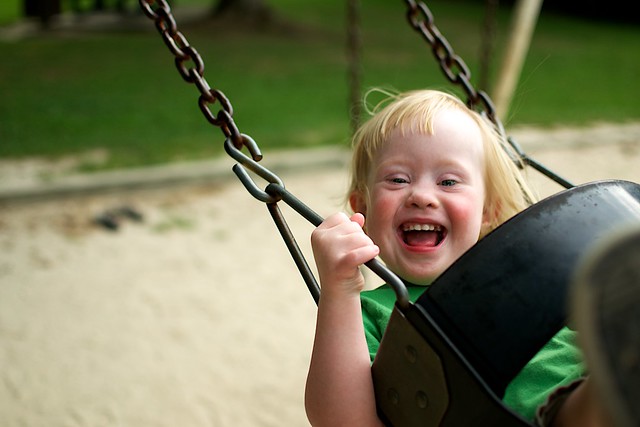 |
| This is the sign for "What the Hell, Mom?" |
We're continuing our multi-part conversation about our responses to the recent NY Times piece called "A Father's Search for a Drug for Down Syndrome." All the guest-posters are parents of kids with Down syndrome.
Today's guest author is krlr, the blogger over at Trial Run who consistently writes thoughtful, emotional, and funny pieces about life in her world. Although it's perhaps not fair to do so, I've borrowed a picture of her daughter from her blog so that we can all appreciate how adorable she is. We haven't had enough visual imagery as part of this conversation, so there you go. I didn't write the caption, because I'm not as funny as krlr.
When I first read Dan Hurley’s article I was dismayed by his unsympathetic description of Dr Costa’s daughter and by his sloppy language. I reread it because it’s about a controversial issue near & dear to my heart and I would have been happy to ignore the former if only to explore the latter. I was still left unsatisfied. He skims the vast ocean of disability, medical testing / experimentation, research priorities and returns to port, never having felt a drop of water. So Sunday morning I wrote over three pages pointing out everything which should have been expanded on and explained …and then I came full circle, conceding he simply couldn’t have charted that ocean in one article in a weekend magazine. I even gave him a little credit for trying to provide context.
And since I criticized Dan Hurley for being unable to navigate this world in one essay I won’t try to in a (hopefully) shorter blog post. Except I can think of few other issues more complicated and emotionally fraught, so bear with me. This is, unbelievably, the short version.
It is a well known fact, not mentioned in the article, that over 90% of fetuses known to have Down syndrome are aborted. However most of the babies with DS are not born to the mysterious 10% who know in advance their baby has an extra chromosome. They are born to moms who refused all testing, knowing they’d never terminate, no matter what, and they are born to moms who were given “indicators” but who decided, for one reason or another, to run the numbers and hope. The non-invasive blood test removes the risks of miscarriage which deterred some of those moms from seeking certainty, and it’s done early enough so that moms haven’t yet felt their little bundles of joy kicking around inside of them. Although some would argue with me, termination is simply safer & easier to consider in the first few months.
One of the test’s developers is quoted in the article as saying it would not be “an obvious step that you would terminate an affected pregnancy,” but over 90% already do. And a good number of them do following a
mid-pregnancy amnio (i.e. post palpable baby movement), and do so despite various advocacy groups’ efforts, and do so despite
Glee’s inclusive cast, and even despite knowing that those with Down syndrome “do far better than once thought possible” (unfortunate phrasing aside). It is impossible to believe the live birth rate for babies with Down syndrome won’t plummet once the new test is available.
Later in the article, the author discussed parents’ ambivalence about a “cure,” the “surprising” 27% of Canadians who said no, and the other 32% who were unsure. It appears counter-intuitive to the numbers above – what diagnosis is so tragic as to warrant a 9/10 termination rate but for which over half of the parents in question would refuse a “fix”? Simple enough – parents can’t imagine loving their kids any more even if “fixed.” Nor do we want replacement kids. He quoted Michael Bérubé, who was leery of “messing with the attributes [his son] has.” The author then wrote parents fear “increasing their children's intelligence might change their personalities – their very identities.”
We fight so hard for our children to be accepted as individuals and afforded equal rights, funding, and basic human dignity – that our reflexive position is defensive. Our children are worthy of respect, just the way they are,
dammit. But there is always a risk in the special needs community of infantilizing the disabled. Kids with Down syndrome, particularly, are stereotyped as being “always so sweet and loving.” My daughter is full of joy, curiosity, and has more personality than 90% of the people I know. She IS sweet and loving. But her brother is too and he only has 46 chromosomes. Neither kid needs “fixing.” But I do not think my daughter’s sweet spunkiness is a direct result of having a 47th choromosome or of her cognitive limitations. To presume she’s sweet
because she’s short a few IQ points is akin to calling her a “pillow angel.”
Doctors are now doing surgery on fetuses with spina bifida so as to eliminate much of what caused those babies’ cognitive disabilities. Several years ago parents of those kids faced eerily similar situations to the parents of kids with DS: a prenatal diagnoses and the decision to terminate or face years of medical struggles, IEPs, and the very real possibility their kid might not be able to live independently. Now spina bifida requires a one hour long surgery to fix. And it’s no longer even experimental, so insurance covers it. It would be interesting to know how much and how fast the termination rate has dropped.
No simple surgery can pry the 47th chromosome out every cell in my child’s body but what about a pill, once a day, that would eliminate her need for IEPs, that would make doing algebra a normal sit-down-and-do-your-homework-young-lady! issue, and not a miracle worthy of report in no less than the NY Times? Or maybe a pill that would “fix” her speech delays so that I can hear her call me Mom? I don’t think her learning to verbalize will lessen the ferocity of her hugs… and easy solutions are tempting.
What’s more, I suspect -or fantasize- that if we reach that point parents receiving a pre-natal diagnosis of Down syndrome will hear, “Yes, it’s unfortunate but it’s managable with this blue pill and a little extra effort,” much as they now tell parents of kids with diabetes that it’s manageable with insulin and little extra care. [Yes, this is a gross over-simplification. But what if it eventually ISN’T?]. Denmark now has the explicit state goal of eliminating Down syndrome – since DS occurs at conception and cannot be prevented with spinach salads or extra Vitamin C, this requires termination. State mandated eugenics, alive and well in Western Europe. Would this policy survive if DS becomes simply a physical condition, requiring maybe a heart repair and extra PT, and not a cognitive issue? No one is advocating eugenics for kids with diabetes. If it becomes a "manageable condition," then maybe my daughter won’t be the “last of a generation”. Also tempting.
Do I think it would end terminations by parents distraught by the diagnoses? No. Parents terminate otherwise planned for babies because they are having girls, or having kids with cleft palates or club feet. Those incapable of handling cleft palate repair, probably wouldn’t want to deal with a baby with “heavy lidded” eyes. [That they might feel differently if our nation’s leading newspaper called them almond or Asian-shaped eyes instead is a different issue].
However - and this is where it gets sticky - would I want them to test their elixir on my child? No. Absolutely not. I’m not going to risk her liver or kidneys or already repaired heart so that she can help them figure out which warning labels to slap on the bottle. She IS fine the way she is. She will lead a happy productive life, with or without algebra. Ten years from now, following widespread use by other people’s kids, I might have a different answer, & will be grateful to those other parents for being braver than I, but while I regret the need for IEPs, I don’t think my daughter needs fixing. Nor do I feel compelled to (possibly) sacrifice her health so that others might be less tempted to end a pregnancy.
But am I doing enough for her if I don’t reach for every conceivable advantage? Some parents are already supplementing with fish oil and ginko biloba – they seem relatively safe. No harm, right? Where is the line between accepting and loving our kids for who they are, doing our job as parents and maximizing their potential, and risking their hearts with the intellectual equivalent of fen-phen? What if the potential options for how she lives her “happy and productive life” are trebled if her noisy NMDA receptors are quieted? As Mr. Bérubé states, “If you’re talking about a medication that allows people to function in society and hold jobs, how can you be against that?” Again,
tempting.
Part one
Part two
Part three
Part four
Part five
 Obviously, if Maybelle decides she's going to be a cheerleader, I will show up and scream and clap and be incredibly proud. But I'm pushing for the meaningfully inclusive not-completely-gender-stereotypical experience. I hope that Maybelle can be a person not defined either by stereotypes of Down syndrome or stereotypes of gender. So let's rest assured that when Maybelle is 9, she'll be attending Girls Rock Charleston.
Obviously, if Maybelle decides she's going to be a cheerleader, I will show up and scream and clap and be incredibly proud. But I'm pushing for the meaningfully inclusive not-completely-gender-stereotypical experience. I hope that Maybelle can be a person not defined either by stereotypes of Down syndrome or stereotypes of gender. So let's rest assured that when Maybelle is 9, she'll be attending Girls Rock Charleston.







